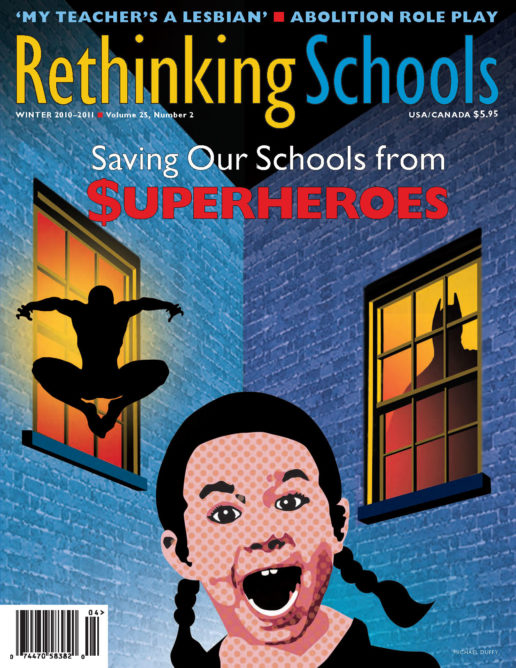Saving Our Schools from Superheroes
Illustrator: Michael Duffy
This isn’t just about a bad film.
The outpouring of critique and activism that greeted last fall’s release of Waiting for “Superman” was a hopeful sign of resistance. Educators, parents, and activists were responding not only to a misleading movie, but also to more than a decade of destructive policies and political rhetoric that is hurting our schools, our students, and our communities.
Grassroots activists from New York to California greeted the movie with picket signs, leaflets, and truth squads. Researchers and scholars exposed its errors of fact and distortion of issues. Teachers and parents raised voices that the movie outrageously left out.
When Rethinking Schools initiated a Not Waiting for Superman campaign last September to talk back to the film and its message, it drew more than 15,000 positive responses in two weeks.
In this issue we trace the politics and money behind this effort to “reform” public education out of existence. Stan Karp tracks how this agenda is playing out in New Jersey with celebrity sponsorship and national implications. Barbara Miner follows the money trail behind the film and its overlapping marketing and political campaigns. At notwaitingforsuperman.org you’ll find much more, including original articles from progressive educators like Michelle Fine and Ira Shor, and an archive of the best reviews and responses produced since the film’s release. You’ll also find lists of alternative films, discussions of the reforms we really need, and ideas about what to do next.
In a moment of clueless arrogance, director Davis Guggenheim posted this invitation on the Huffington Post : “Teachers, tell me what you think” (along with a discount offer to see his teacher-bashing film during Teacher Appreciation Week). In return he received pages upon pages of scathing comments from educators and parents. Perhaps the best response came from a veteran early childhood teacher who said: “I felt personally offended by your film. Its oversimplified and antagonistic message has stirred me into becoming a whole education activist.” That is the best response the film could get.

